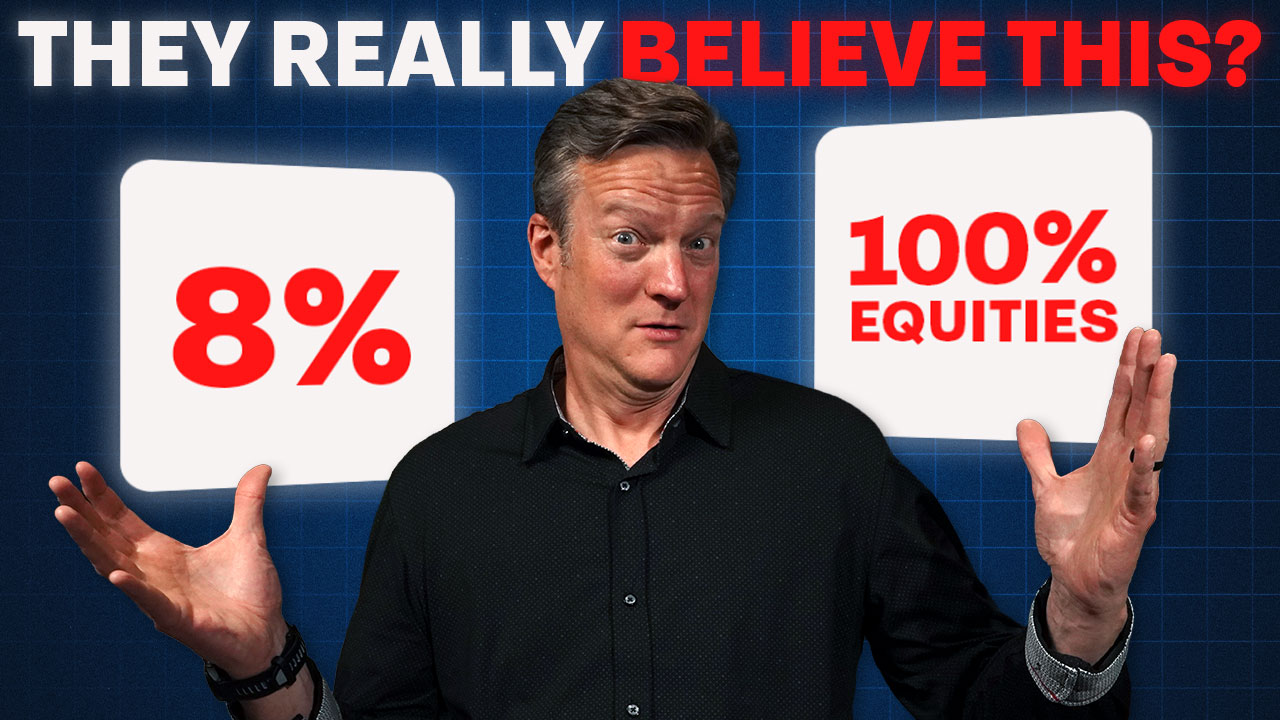Let’s talk about now how to win with money if you’re making $100,000 a year. Now, $100,000 in six-figure land, that’s a big deal and sounds great on paper, but the reality is, at the stage of your life where your income starts to reach this level, you’re probably noticing, “Holy cow, I have a thousand different things pulling me in a thousand different directions.” Yeah, I, when I was younger, this is what I aspired to. By 30, I wanted to have six figures of income. You guys know the rest of the story. I actually was a year behind on this goal. And then when I even got there, I was disappointed because it’s this term we have coined called the messy middle. On paper, this looks so big, but then you overlay with this the fact that typically at this stage, you’re married or you have a significant other, you’re trying to buy that first house, you’re having a growing family. This is the decade you’re going to have your first kids, and you realize, where did all the money go? And it is an amazing thing in the messy middle, ’cause not only are you short on time, but you’re definitely being squeezed on all those financial commitments. Yeah, man, you have all this stuff pulling on you, and yet the disposable income that you would think you would have, $100,000 of income just isn’t there. So we would think that when you’re in the messy middle, when this is the station and stage of life that you are approaching, you have to be diligent with how you approach both what you’re doing with your army of dollar bills and how you are approaching consumption. So if you want to think through what are the ways to get ahead, we want you to make sure there are things you aren’t missing. The very first idea is to understand where your blind spots are. Recognize that when you have things pulling you in a thousand different directions, it’s easy to take your eyes off the ball. But if you can force yourself to not do that, you’re likely going to be able to keep yourself protected. Well, also, you probably have, as we just shared, people counting on you. So don’t skip considering risk. I mean, if you’ve got people counting on you, emergency reserves are going to be so important. Look, we want you saving and investing for the future, but don’t overlook steps one and four of the financial order of operations, ’cause that’s the stuff that’s going to keep your financial life out of the ditch. The other thing that you can do, and it sounds counterintuitive once you’re making $100,000 of income, that’s a lot of income. But if you’ve never done this before, you might need to start thinking about budgeting. If you’ve never actually looked to see where are my dollars going every paycheck or every month, this might be the time that you do that. You’ll recognize how much money is just getting thrown away. And if you can shrink and tighten that budget, you’re going to give yourself excess and margin to be able to navigate some of these difficult life circumstances. And then I don’t want you to be moving the goal post. Lifestyle creep is a real thing. There’s nothing wrong with you having a growing life as you’ve had more success, but do it, like all things, in moderation. Because what you don’t want to do is start having those mental gymnastics that you do as in, “Hey, I got a pay raise. You know what I could afford? That car. And then, oh, I could afford that bigger house.” You do this. And then you fast forward six years, and you never increased your savings. You never increased your investments. But yet, your need and demands for your money has actually grown because you’re living off of the outsized increases from the pay raises. Don’t fall into that trap. Don’t keep moving the goal post. And watch out for lifestyle creep. And then the last thing I would say as a method to get ahead is make sure that you’re building good habits. You know, when you first start out in your career, at the very beginning, you likely don’t have any habits at all. You’re trying to figure it out. But if by the time you get to where you have a six-figure income and you’ve not been focused on building good habits, odds are you have been building bad habits. So you have to intentionally focus and say, “Okay, are the things I’m doing with my money, are the places that I’m putting my dollars the right places? The places that make sense, that are building the future that I want to have?” And if they’re not, you might have to work through some retraining. You might have to strip down to the basics so that you can start building on those good habits so that you can start making those necessary decisions to put your future self in the financial position you want to be in. Yeah, I love Automatic Millionaire steps, and I think about like step two of the financial order of operations, the free money. If you know your employer is going to give you 6% if you put in 6%, go ahead and make sure at a minimum you have locked in doing 6%. If you can go ahead and take it up to 10%. And then I also want you to think about if you know that Roth IRAs allow you to put $7,000 a year, go ahead and figure out how you can put that in every month. If you take $7,000, divide it by the 12, lock that monthly investment in. So it’s automatic millionaire status just by having and making the good behaviors and the good habits as easy as possible because they’re automatic. They will be insulated from the behavioral and all the other traps out there because that money is already locked in and it’s building the future. I love it. All right, let’s talk about some numbers. Let’s talk about how much you could invest if your goal is that by the time you get to retirement, by the time you get to age 65, you want to replace 80% of your pre-retirement income. We want to look at two scenarios because odds are by the time you’re making $100,000, there’s a chance that you’ve saved up something. So we’re going to talk about folks that are on track and have been saving and how much additional savings are required. And then we’re going to talk about folks that are starting at zero so that way you can figure out where you fall. Well, if you’re a 30-year-old, according to research done by Fidelity, they say you should have about one times your annual salary saved up in investments. So if you have one time your annual salary saved up and you can continue to save 10% of your gross income from age 30 to 65, there’s a high likelihood that you’ll be able to replace 80% of your pre-retirement income. If you’ve not saved anything by the time that you get to 30, your savings rate needs to be closer to 17%. By the time you get to 35, Fidelity would suggest that you need about two times your annual salary saved up. If you’ve done that, your savings rate to replace 80% should be about 9.5%. If you’re at 35 starting at zero, you have to have a much healthier save rate. You’d have to be saving about 24% of your gross income. And then by the time you get to 40, Fidelity would suggest that you need about three times your annual salary saved. If you’ve been doing that, the savings rate required for you to have an 80% replacement ratio would be about 11% of your gross pay. If you’ve not done anything by age 40, you’ve got to get serious. And you’ve got to make some drastic and serious adjustments to be able to have the retirement that you want to have by normal retirement age. The save rate for those 40-year-olds is about 35% of your gross income. I do want to tell my financial mutants to listen up a little bit because I think it’s some of the data, especially for those that are supposedly on track according to Fidelity with the one times, two times, and even three times, you’re like, “But how does this work for me when you guys are always talking about the 20% to 25% savings rate?” Look, there are scenarios that we’ve built into these assumptions with the 80%, with the low rate of return at 6%. I would still like you to, if you can, so that way you’re, once again, making the good habits easy, the bad habits hard. If you have the income and the ability to save 20% to 25%, I would like you to do it because you might be in the exact same scenario as me, is where I thought I was done at 50, so I was going to be a hyperaccumulator. So I was saving as much as I could while I was young so my army of dollar bills could grow. Now I’ve gotten to this age and this decade, and I’ve realized I actually love work, and I’m not going. But now I have the flexibility to do things on my term. So if you can still prioritize, because I don’t want you to increase your consumption, it allows you to have more flexibility later. And that’s really the key thing I want you to get, the best version of yourself through all stages, bedazzle the basic life by building memories, even when you’re broke. But also don’t get in an opportunity or a situation where you’ve expanded your lifestyle, and it squeezes you into a job or a situation that you’re not really happy or enjoying yourself when you get in those 40s and 50s.














